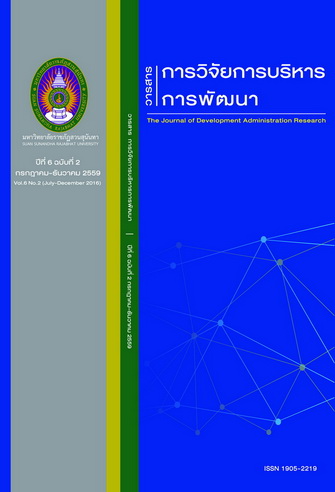การเชื่อมโยงการศึกษาโดยครอบครัวกับโรงเรียนและผลสัมฤทธิ์ทางการเรียนของ เด็กระดับการศึกษาขั้นพื้นฐาน
คำสำคัญ:
การศึกษาโดยครอบครัว, ผลสัมฤทธิ์ทางการเรียน, ความร่วมมือบทคัดย่อ
การวิจัยนี้มีวัตถุประสงค์เพื่อศึกษาสภาพปัจจุบันของความร่วมมือระหว่างผู้ปกครองที่จัดการศึกษาโดยครอบครัวกับโรงเรียนที่มีผลสัมฤทธิ์ทางการเรียนของเด็กในการจัดการเรียนการสอนขั้นพื้นฐาน และศึกษาปัจจัยที่ส่งผลต่อผลสัมฤทธิ์ทางการเรียนของเด็กที่ผู้ปกครองจัดการศึกษา โดยครอบครัวที่มีความร่วมมือระหว่างโรงเรียนในการจัดการศึกษาขั้นพื้นฐาน เป็นการวิจัยแบบผสมผสานระหว่างการวิจัยเชิงปริมาณสอบถามผู้ปกครอง จำนวน 113 ครอบครัวด้วยแบบสอบถาม ใช้การวิเคราะห์เส้นทางความสัมพันธ์ การวิเคราะห์ถดถอยพหุเชิงชั้น และการวิจัยเชิงคุณภาพสัมภาษณ์เจาะลึกผู้ปกครองและผู้บริหารโรงเรียน จำนวน 5 คน ด้วยแบบสัมภาษณ์ ใช้การวิเคราะห์เนื้อหา ผลการวิจัยพบว่า ความร่วมมือจากโรงเรียนด้านห้องปฏิบัติการ ครูชำนาญการและการประเมินผลขึ้นอยู่กับความต้องการความช่วยเหลือด้านวิชาการ แหล่งเรียนรู้ชุมชนด้านกิจกรรมการเรียนรู้ ความพร้อมผู้ปกครองด้านเวลาจะส่งผลต่อพฤติกรรมการสอนของผู้ปกครองก่อนจึงจะส่งผลต่อผลสัมฤทธิ์ทางการเรียนของเด็กในเรื่องวิชาการ การปรับตัวทางสังคมและด้านคุณธรรมที่ดี
เอกสารอ้างอิง
รัชนีวรรณ พงศ์พิสิฐสันต์. (2545). รูปแบบการจัดการเรียนการสอนเพื่อการศึกษาโดยครอบครัว. ปริญญานิพนธ์การศึกษามหาบัณฑิต (เทคโนโลยีทางการศึกษา), มหาวิทยาลัยบูรพา.
ศรีเรือน แก้วกังวาน. (2545). การเพิ่มระดับ IQ โดยใช้โปรแกรมการเรียนที่พัฒนาจากแนวคิดเรื่องสติปัญญาของ Thurston (Multiple Factor Theory). มหาวิทยาลัยธรรมศาสตร์.
สำนักงานเลขาธิการสภาการศึกษา. (2547). รายงานการวิจัยสภาพการณ์และฐานข้อมูลการจัดการศึกษาโดยครอบครัวในสังคมไทย. กรุงเทพฯ: พิมพ์ดี.
อมรวิชช์ นาครทรรพ์. (2543). รายงานการวิจัยการจัดการศึกษาโดยครอบครัว Home School: ประสบการณ์ของนานาประเทศ. กรุงเทพฯ: สำนักงานคณะกรรมการการศึกษาแห่งชาติ.
Barkholz, J. (2001). Learning to home school literacy: A case study. Retrieved December 12, 2005, from http://www.lib.umi.com/dissertations/fullcit/3041131
Butler, S. (2000). The “H” word: home schooling. Gifted Child Today, 23(5), 44-50.
Campbell, C. B. (2002). Shelby county public libraries and homeschooling parents. Alabama Librarian, 52(1), 11-12.
Chapman, C. (2003). Trends in the use of school choice 1993 to 1999 Statistical Analysis Report. Retrieved February 28, 2007, from www.heartland.org/article.efm?artld=12366
Chris, J. (1994). Why parents choose home schooling. Educational Leadership, 52(1), 50-52.
Corwyn, F. R., & Bradley, H. R. (2001). Home environment and behavioral development during early adolescence: The mediating and moderating roles of self-efficacy beliefs. Merrill-Palmer Quarterly, 47(20), 165-187.
Douglas, F. (2002). An evaluation of Florida’s home school students’ sports participation in the Florida high school Activities Association: An initial study. Retrieved December 12, 2005, from http://www.lib.umi.com/dissertations/fullcit/3059922
Gale, V. (1994). A qualitative study of literacy instruction in one home school setting. Retrieved December 12, 2005, from http://www.lib.umi.com/dissertations/fullcit/9523356
Harbin, N. (1999). A comparison of physical fitness levels of home school and public school students in South Alabama. Retrieved December 12, 2005, from http://www.lib.umi.com/dissertations.fullcit/9931614
Huber, E. (2004). Home school researcher. Retrieved December 12, 2005, from http://www.nheri.org/pdfs/161
Jean, G. (2000). Status of admission policies and practices at four-yearpublic institutions of higher education in Virginia implemented to evaluate home school applicants. Retrieved March 6, 2007, from http://www.lib.umi.com/dissertations/fullcit/9911812
Kaziunas, E. (2004). Mother as teacher: Vocation and identity of women who home school. Retrieved June 25, 2006, from http://www.macaleter.edu/lillygrant/lassays/kaziunas.pdf
Keys, S., & Bemak, F. (1997). School-family community linked services: A school counseling role for changing times. The School Counselor, 44(1), 255-263.
Lines, P. M. (2000). Home schooling comes of age. The Public Interest, 14(1), 74-85.
Marie, K. (1995). A qualitative description of the beliefs and practices of home schooling families as they relate to the development of emergent literacy among young children with the home school. Retrieved December 12, 2005, from http://www.lib.umi.com/dissertations/fullcit/9600064
Medlin, R. G. (2000). Outreach to Homeschoolers. Alki, 17(1), 13-19.
Miles, M. L. K. (1995). Home schooling. Retrieved December 12, 2005, from http://www.efn.org/light/thesis
Prange, S. (2002). A Lutheran school responds to homeschooling. Lutheran Education, 137(3), 205-213.
Randall, J. (1989). The CBN University model of education provides the most effective home school model. Retrieved December 12, 2005, from http://www.lib.umi.com/dissertations/fullcit/1333716
Ray, B. D. (2000). Customization through homes schooling. Educational Leadership, 59(7), 50-54.
Rebecca, W. (1999). Parents defend Internet teaching. The Time Educational Supplement, 14(1), 43-44.
Reese, L. (2002). Parental strategies in contrasting cultural settings: Families in Mexico and “E1 Norte”. Anthropology & Education Quarterly, 33(1), 30-59.
Reich, R. (2002). The civic perils of homeschooling. Educational Leadership, 59(7), 56-59.
Revero, L. (2002). Progressive digressions: Home schooling for self-actualization. Roeper Review, 24(4), 197-202.
Romanowski, M. H. (2001). Common arguments about the strengths and limitations of home. The Clearing House, 75(2), 79-83.
Rudner, L. M. (1999). The scholastic achievement and demographic characteristics of home school students in 1998. Purcellville, VA: Home School Legal Defense Association.
Rutkowski, K. (1998). Homeschool pioneers on the web. Multimedia School, 5(3), 76-80.
Wagenaar, C. T. (1997). What characterizes home schoolers? A national study. Education (Chula Vista, Calif.), 117, 440-444.
Ward, L. (2004). A preliminary investigation of the effectiveness of home school instructional environments for student with. The School Psychology Review, 33(1), 140-158.
Wenders, J. T. & Clements, A. D. (2004). Homeschooling in Nevada The Budgetary Impact. Retrieved June 10, 2007, from www.education_consumers.com
Wichers, M. (2001). Homeschooling: Adventitious or detrimental for proficiency in higher education. Education (Chula Vista, Calif.), 122(1), 145-150.
ดาวน์โหลด
เผยแพร่แล้ว
รูปแบบการอ้างอิง
ฉบับ
ประเภทบทความ
สัญญาอนุญาต
บทความที่ได้รับการตีพิมพ์เป็นลิขสิทธิ์ของมหาวิทยาลัยราชภัฏสวนสุนันทา
ข้อความที่ปรากฏในบทความแต่ละเรื่องในวารสารวิชาการเล่มนี้เป็นความคิดเห็นส่วนตัวของผู้เขียนแต่ละท่านไม่เกี่ยวข้องกับมหาวิทยาลัยราชภัฏสวนสุนันทา และคณาจารย์ท่านอื่นๆ ในมหาวิทยาลัยฯ แต่อย่างใด ความรับผิดชอบองค์ประกอบทั้งหมดของบทความแต่ละเรื่องเป็นของผู้เขียนแต่ละท่าน หากมีความผิดพลาดใดๆ ผู้เขียนแต่ละท่านจะรับผิดชอบบทความของตนเองแต่ผู้เดียว




